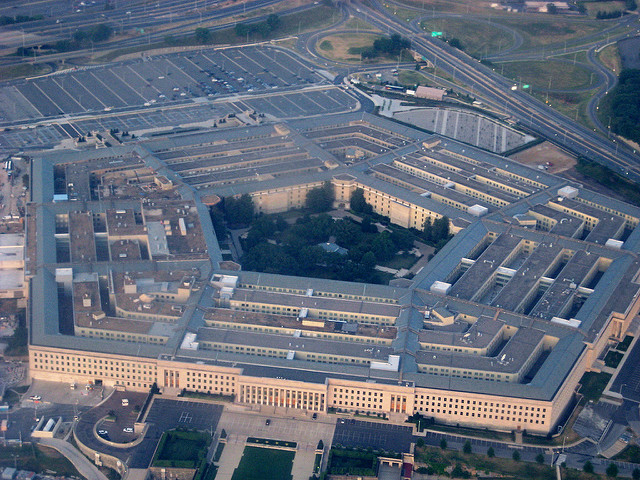 CLOUD
CLOUD
 CLOUD
CLOUD
 CLOUD
CLOUD
The U.S. Defense Department’s internal watchdog agency said today that the evidence it has received on the JEDI contract suggests procurement personnel weren’t pressured by the White House to award the deal to Microsoft Corp.
However, the watchdog added that it “could not review this matter fully” because some DOD officials didn’t answer questions.
The JEDI or Joint Enterprise Defense Infrastructure contract is a cloud computing project to modernize the Pentagon’s technology capabilities that will be worth up to $10 billion over 10 years. Microsoft Corp. nabbed the deal last year even though Amazon Web Services Inc., its larger rival in the cloud market, was widely expected to come out on top. The companies have been locked in a high-profile legal battle over the contract ever since.
AWS charged in a December filing that improper pressure from President Donald Trump influenced the Pentagon’s decision to entrust Microsoft with the project. At the time, the cloud giant said that Trump “launched repeated public and behind-the-scenes attacks to steer the JEDI Contract away from AWS to harm his perceived political enemy — Jeffrey P. Bezos.”
In a 317-page report released today, the Pentagon’s Office of the Inspector General wrote that “we believe the evidence we received showed that the DoD personnel who evaluated the contract proposals and awarded Microsoft the JEDI Cloud contract were not pressured regarding their decision on the award of the contract.” However, the watchdog wrote that certain senior officials including the Defense Secretary didn’t give investigators information on JEDI-related communications between the Defense Department and the White House, citing presidential privilege.
“Therefore, we could not definitively determine the full extent or nature of interactions that administration officials had, or may have had, with senior DoD officials regarding the JEDI Cloud procurement,” the OIG stated.
AWS was unimpressed with the report, saying it “doesn’t tell us much.”
“It says nothing about the merits of the award, which we know are highly questionable based on the Judge’s recent statements and the government’s request to go back and take corrective action,” a spokesperson said. “And, it’s clear that this report couldn’t assess political interference because several DoD witnesses were instructed by the White House not to answer the IG’s questions about communications between the White House and DoD officials. The White House’s refusal to cooperate with the IG’s investigation is yet another blatant attempt to avoid a meaningful and transparent review of the JEDI contract award.”
Several current and former government officials appeared to agree with AWS’ assessment. Democratic Rep. Adam Schiff tweeted, “When he’s not firing Inspector Generals, Trump is obstructing their investigations. Here, he’s hiding communications about a DOD contract for Amazon, a company Trump has repeatedly tried to punish because its founder owns the Washington Post. The corruption is in plain sight.”
“The IG ruling gives us half the story,” Andrew Hunter, a former DoD acquisition official and now head of defense-industrial studies at the thinktank CSIS, told Breaking Defense. “The refusal by the White House to allow witnesses to testify, based on a Presidential communications privilege, seems to invite further investigations by Congress, as it seems to imply the President or his senior staff was directly engaged with DoD on a source selection decision.”
Remarkably, a Pentagon spokesman, Lt. Col. Robert Carver, took the opportunity to slam media coverage of the case. “This report should finally close the door on the media and corporate-driven attacks on the career procurement officials who have been working tirelessly to get the much-needed JEDI cloud computing environment into the hands of our frontline warfighters while continuing to protect American taxpayers,” he wrote in a mass email.
The allegation about White House interference is just one of several points that has come up in the litigation over the fate of JEDI. The technological aspects of the project are in the spotlight as well. AWS in February won an injunction to pause Microsoft’s work on the project after convincing a judge that Microsoft’s bid likely contained a technical deficiency, a move that led the DOD to ask the companies to revise their proposals.
The OIG emphasized that its review did not look into the contract’s technical dimension. “We did not assess the merits of the DoD’s technical or price evaluations, and we did not review or verify the DoD’s technical or price evaluations of the contractors’ proposals,” the watchdog’s report stated.
Beyond these core points, the OIG did find a couple mishaps in the JEDI award process. It determined that the Defense Department accidentally disclosed some proprietary information related to Microsoft’s proposal to AWS in violation of regulations and also failed to redact the names of some procurement officials.
With reporting by Robert Hof
THANK YOU